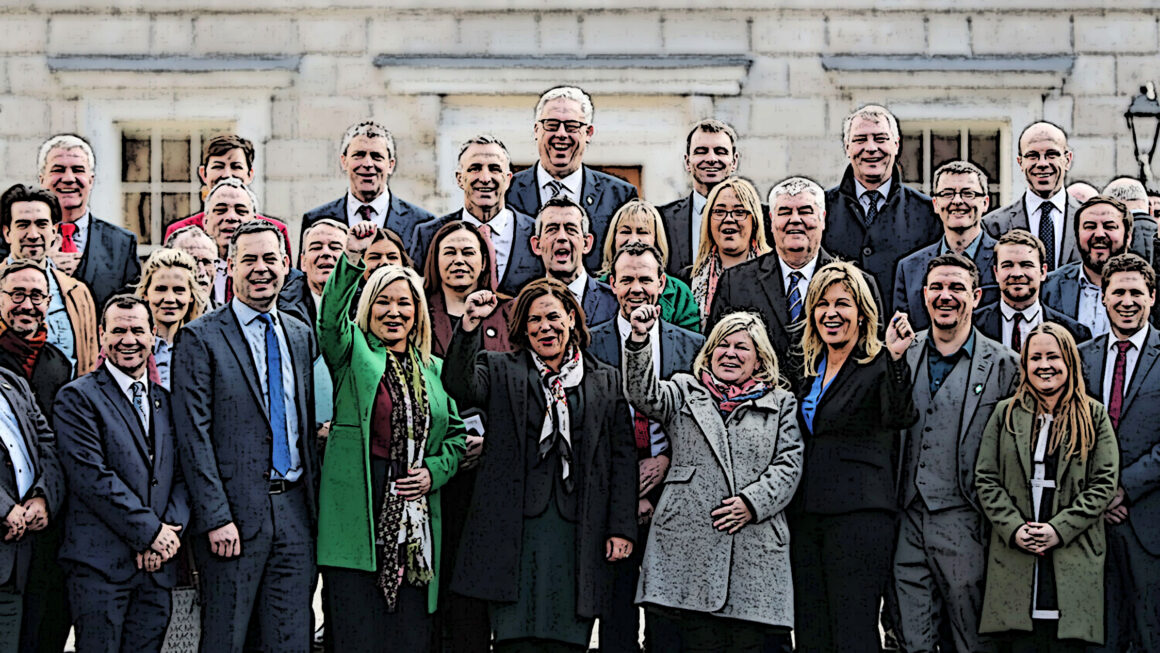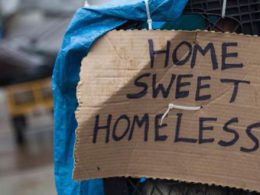Sinn Féin could well lead the next Government in the South. This would be historic in Irish politics but raises many questions, including: would Sinn Féin actually deliver the real change that working-class people need and hope for? Can Sinn Féin be pushed to a genuine left position that marks a radical shift from previous government policies, or in power will it disappoint? What should be the attitude of socialists to such a Government? Here, Kevin McLoughlin engages with these questions.
In many polls now Sinn Féin matches the support of Fine Gael and Fianna Fáil combined. But there are no guarantees of victory, and some of the most recent polls in late October and early November indicated improvements for Fine Gael and Fianna Fáil and a certain drop for Sinn Fein. However, this post-Budget bounce may not last given the challenging economic and social conditions coming down the line, and the decline of the government parties could well re-assert itself.
Of course, Sinn Féin’s line in the Dáil is to strongly oppose both Fianna Fáil and Fine Gael. This helps to bolster the notion that if Sinn Féin does very well, combined with smaller parties and independents it could potentially form the first government without either of the two main parties of Irish capitalism and consequently, that the prospect of a so-called Left Government is a real one.
Getting to grips with Sinn Féin
Understandably, calls have consistently been made by people on the left that Sinn Féin should rule out coalition with both Fianna Fáil and Fine Gael, with the clear implication that if Sinn Féin was in government with either party it would be forced to compromise on its policies and promise of change. However, regardless of the calls, even if Sinn Féin is the clear winner of the next election it remains entirely possible, and perhaps most likely, that it would form a Government with one or other of the traditional right-wing establishment parties, most likely Fianna Fáil.
Another implication is that if neither party is involved then Sinn Féin would have the freedom to pursue its own agenda, and could even be pressurised and pushed to the left and into implementing more radical policies.
What is implied by these scenarios is that Sinn Féin offers the possibility of real change, that it is politically open, perhaps without a fully fixed position, which can potentially be shaped by outside forces, including those on the left and movements from below. But is this an accurate assessment?
Cosying up to corporate Ireland
Modern Sinn Féin has been on an electoral path and striving toward governmental power for more than 30 years. Abstentionism, the policy of not taking seats in “Leinster House”, was dropped in 1986 and it has been in government in the North on and off since 1999. It is a matter of record that Sinn Féin has agreed to operate within the economic, political and legal confines of capitalism, including its more pernicious neoliberal variant. In the North, it has consistently implemented neoliberal policies, including overseeing the privatisation or part-privatisation of public services. In the South, as the leadership on many councils, it has not distinguished itself either, adopting similar policies.
One journalist recently wrote, “For now, it is the historic level of engagement between Sinn Féin and Ireland Inc that is significant.”1 Reflecting this reality, Louise O’Reilly, Sinn Féin’s Enterprise spokesperson stated, “I’m very conscious of the fact that there are people with ideas right across the spectrum from the smallest to the biggest businesses and we need to talk to everyone.” Instead of any indication that Sinn Féin is moving to the left, there is a pronounced trend of its representatives meeting business interests, politicians and senior civil servants (including former Tánaiste, Health Minister and neoliberal hawk Mary Harney),2 to develop relations, and reassure them that a Sinn Féin-led administration won’t harm their interests. Housing spokesperson Eoin O’Broin was even publicly reprimanded by the party and forced to apologise for what was a perfectly legitimate criticism of a senior civil servant and economic adviser to the government.3
As the Business Post put it: “Policies which to date had been too vague or not properly costed are being crystallised – sometimes resulting in fierce internal debate – while policies that are too populist or too expensive to deliver are being discreetly winched back towards the centre or quietly dropped altogether.”4 Sinn Féin representatives have recently said it may take two terms in office before a “fairer” Ireland will emerge.
Sinn Féin is not just a vessel to be filled. Its leadership has a very developed political position and worked-out strategic approach, which is rooted in two main beliefs. One is their desire for power, and their notion that they can achieve improvements based on their ability to run the Irish capitalist economy and state better than Fianna Fáil and Fine Gael. The other is their conviction that a united Ireland would somehow magically transform the prospects of Irish capitalism and peoples’ living standards. This is despite global capitalism being in such a decrepit state that it is wreaking unprecedented economic and ecological devastation, as well as spawning wars.
Not the same, but not different
This does not mean that a Sinn Féin government in the South would be just the same as the rest. The administrations of Fianna Fáil and Fine Gael have been politically and morally corrupt, slavish disciples of pro-corporate policies. There is political space for Sinn Féin to adopt a different approach to some issues, while still remaining within the confines of capitalism. Clearly, it could build significantly more homes than is currently being done – it would be hard to build less. But it is doubtful that it will reach its target of 20,000 homes a year by relying on the private sector, as its policy does. In any case, its overall target of 100,000 over five years falls short of what is needed and would mean many still cannot access affordable housing.
Sinn Féin could also alter the style of government and cut back on the mercs, perks, wages, pensions and trappings of office. But there is a definite limit to how different a Sinn Féin-led government will be because fundamentally it is committed to operating by the logic and within the constraints of the capitalist market, which by its nature puts business interests and profit before people. Of course, even a capitalist government has the power to intervene to curb the excesses of the market system and challenge inequality, but the indications regarding Sinn Féin are not good.
For example, its recent submission to the Commission on Taxation and Welfare praised Ireland’s “domestic tax regime” and said it was a “core element of the state’s economic policy”.5 Moreover, it has for years advocated that the corporation tax rate in the North be reduced in line with the pitiful rate in the South. Yet low taxes on big business is one of the key reasons why public services in Ireland are way below the quality of other European countries. This means that under Sinn Féin the crises in health, education and childcare are likely to remain.
Crisis conditions
There are increasing predictions and many genuine indications of a looming global recession, and if that is the context in which Sinn Féin comes to power then developments could be even more dramatic. Some might think that such conditions, which further expose the bankruptcy of capitalism, might actually force Sinn Féin towards left and socialist policies, in particular if there are movements and struggles in response to the crisis.
In such conditions, Sinn Féin’s rhetoric would undoubtedly change, and in government it could also take measures to mitigate aspects of the crisis. Even Fianna Fáil and Fine Gael changed tack when the pandemic struck, and have yet to revert to the austerity policies they swore by in the 2010s. However, in the final analysis, Sinn Féin will resort to capitalist solutions to such a crisis. That means trying to recreate the conditions in which capitalists will invest – in which they can make more profits – and that means attacking workers’ wages and conditions, and the public services they rely on.
The crisis that the Syriza-led government in Greece faced in 2015 had a significant impact on Sinn Féin. This was a left-led government that vowed to fight austerity, which came largely as a result of diktats from the Troika of the EU, the ECB and the IMF. In the end, after months of resisting the pressure, with massive support from the Greek working class, Syriza capitulated. The lesson Sinn Féin learnt from this was not that you need to be prepared to stand up to these capitalist institutions and break with their system if you want to defend and improve the living standards of working-class people, but rather that you need to accept the rules set down by the EU et al, which Sinn Féin has now pledged to do.
Playing the green card
Yet there will be huge hopes in a Sinn Féin-led government and it could experience a honeymoon for an extended time. However, its approach will invariably fall short and it won’t really deal with the key issues or alter people’s lives in a real and qualitative way and disappointment will emerge. In that context, Sinn Féin will consciously elevate the national question and the need for a border poll in particular. It will say, wrongly, that a united Ireland is the means by which the economic and social problems can be dealt with and in that way try to smother people’s class anger in nationalist sentiments.
Many working-class people have a genuine aspiration for the unification of the country, and therefore attempts to divert attention away from Sinn Féin’s failures can have an impact, and will need to be challenged. But people in the South are primarily voting for Sinn Féin because they want to see change in their economic and social conditions now, and the likelihood is that significant sections of working-class people will begin to judge them harshly if they do not deliver.
Serious challenges
It was necessary to deal with the nature of Sinn Féin and the role it will play in order to properly contextualise what attitude socialists should adopt towards a Sinn Féin government.
And socialists face contradictions. On the one hand, there is the perception of Sinn Féin among a growing number of working-class people who have hopes that electing Sinn Féin may represent the easiest way forward. And on the other, is the reality that while Sinn Féin might be a means to get Fianna Fáil and Fine Gael out, it does not represent a way forward and instead is likely to create dangerous and divisive conditions for working-class people. Whether in coalition with Fianna Fáil or with a number of smaller parties and independents, a Sinn Féin-led government will be a capitalist government.
This re-enforces the argument that what is really needed in Ireland is for working-class and young people to get politically active, forming new campaigns, struggles and a broad left party in the process, with the goal of breaking with capitalism. There are more than 2.5 million workers in the South and if organised and clear-sighted, they would be an unstoppable force.
However, it is unlikely that the momentum behind Sinn Féin will be stopped before the next general election, and people will learn mainly from their own experiences of Sinn Féin in power. But this poses some serious dangers. If a basis isn’t laid for the development of the type of movement mentioned above in the next few years there is a real danger that generalised disappointment with Sinn Féin in power could translate into deep demoralisation in society, conditions in which, among others, the populist and far right can thrive. At the same time, the left and socialist parties that exist could be weakened, squeezed out of the Dáil if Sinn Féin succeeds in eating into their vote by sucking up the support of all working-class and young people. Having an identifiable body of workers, young people and socialists, including having a fraction of TDs in the Dáil, able to provide a genuine left and socialist way forward when Sinn Féin is in power is vital.
Principles and tactics
The basic approach of socialists to capitalist governments has been clearly established ever since the debates in the Socialist International at the turn of the 20th century, when the revolutionaries, including James Connolly, opposed Alexandre Millerand joining the French cabinet. Essentially, socialists should not support, join or sow illusions in capitalist governments, instead they should focus on building up the power of the working-class movement and the socialist alternative. Rosa Luxemburg pointed towards the pressure and traps that can exist when she said:
“The character of a bourgeois government isn’t determined by the personal character of its members, but by its organic function in bourgeois society. The government of the modern state is essentially an organisation of class domination… With the entry of a socialist into the government, and class domination continuing to exist, the bourgeois government doesn’t transform itself into a socialist government, but a socialist transforms himself into a bourgeois minister.”6
We would hope there is agreement on this basic principle in the left and socialist movement, and its relevance in the context of a Sinn Féin government. However, this does not answer the question of how socialists can successfully stand against the Sinn Féin stream.
Clearly, if it is crudely stated that Sinn Féin’s support for capitalism and nationalism will lead to major problems and disappointments, people who at the moment support Sinn Féin would recoil and could understandably interpret such points as sectarian bickering. But at the same time, if the left and socialists remain silent and do not raise any real questions over Sinn Féin’s approach, or act to reinforce the illusions in Sinn Féin for fear of being marginalised, that would be a huge problem. Such misdirection can both weaken the distinct identity of the left and socialists and thereby undermine their own base before an election, as well as deepening any subsequent demoralisation when Sinn Féin does not deliver, and thereby serve to undermine the confidence of the working class.
Shrewd and sharp interventions
It is precisely because there are developing illusions in Sinn Féin that socialists have to be, as Lenin once said, “sufficiently thoughtful, sufficiently attentive, sufficiently intelligent and sufficiently shrewd” in what they say about Sinn Féin.7 But we also should be confident that definite sections of working-class and young people are thinking carefully and will understand when we outline the type of policies necessary for real change and, in that context, raise questions either implicitly or explicitly over Sinn Féin’s policy and approach.
We should not view the support for Sinn Féin as uniform or fixed. Socialists should speak primarily to the issues, as well as outline the case for people to organise themselves to fight back and exert pressure; that we can’t wait two years for an election (‘wait for the next election’ is the current refrain from Sinn Féin); but crucially, again and again link the issues, like cost of living, housing, health, etc., in a definite and detailed way to the need to break with the ‘for-profit’ approach that capitalism is based on, which is at the root of all of these issues.
If we are able to skillfully and convincingly outline what needs to be done on the issues – after explaining how it is FF, FG and the establishment generally who are responsible for the problems – that can then be compared to what the other political forces, including Sinn Féin, are saying or doing. In that way, without crudely attacking Sinn Féin, we can raise questions regarding its approach without being viewed as sectarian. Most people are focused first and foremost on defending and improving their own and their loved ones’ lots, which means there is potential for sections to be won to a more fighting and left and socialist position, as the best way of doing that.
In the autumn of 2014, virtually all parties and commentators thought that Sinn Féin would romp home in the Dublin South West By-Election – that its base of support and its lead in the local polls could not be overcome. But we did overcome it, because we understood it was not as fixed as some people thought. We focused on the issues, primarily the water charges, showing what needed to be done and contrasting that to what Sinn Féin was saying and doing, or not saying and doing. Of course, the support for Sinn Féin today is broader and also somewhat deeper, and as a result, the pitch and tone of how we would raise questions or doubts over Sinn Féin would be different. But the underlying approach of focusing on the issues that impact the lives of working-class people and having confidence that enough of them will respond to a clearer alternative is very relevant for the next two years.
Different approaches on the left
At the moment it would be fair to say that there are fraternal differences among some on the left, and certainly between the Socialist Party and People Before Profit (PBP), regarding Sinn Féin.
In an article published earlier this year, John Molyneux of PBP and the Socialist Workers Network (SWN) said, “This raises the possibility (probability even) of a Sinn Féin-led government after the next election, and poses directly the question of how the far left should respond to this. It is clear that this would be a major development that will be fiercely resisted by the Irish political establishment and much of the Irish ruling class. Ireland has never had even the semblance of a left government, and there is no doubt that a Sinn Féin-led government would be seen in this way, particularly by the working class, who would be hopeful of real change.”8 (Emphasis added)
John’s point about Sinn Féin in government being “fiercely resisted” significantly underestimates its shift to the right and the extent to which it is reassuring big business and the right-wing media, and is already being viewed differently by many. (For their part, the business and media establishment recognise that Sinn Féin’s support has risen and its position in Irish politics has changed as a result – it can’t just be vilified as it once was.)
This leads John to talk of the danger of being marginalised if you criticise Sinn Féin, which, as noted above, is a danger that does exist. However, basically the approach of PBP is to say that a genuine left government is now possible because of the growth in support for Sinn Féin, and that they would be enthusiastic about being part of that government as long as their core demands were met. Specifically, he says that:
“[PBP] is stating clearly that it is campaigning for a left government and will certainly use its votes in the Dáil in favour of Mary Lou McDonald as taoiseach. But PBP wants to see a genuine left government that actually takes on capitalism and will only consider joining the government (that is, taking ministerial posts) if its core demands are met. The exact nature of the demands will have to be determined according to the circumstances prevailing at the time, but they would need to be both radical and popular, making sense to a lot of working-class people.”9
This is too vague, and also contradictory, as the eight indicative core demands that he lists as an example do not in themselves amount to a break with capitalism. Also, notwithstanding that John recognises that a Sinn Féin-led government would be a capitalist government, and that it would be a “disaster” if PBP rushed to join such a government (presumably meaning without having achieved full agreement on its core demands), the main slant of PBP’s position is that Sinn Féin is on the left and that they are open to be in government with them.
Don’t reinforce illusions
In a statement after the General Election in 2020, PBP noted the decline in the votes of Fine Gael and Fianna Fáil and the ‘Vote Left, Transfer Left’ factor, and said: “The parties who gained from this upsurge, Sinn Féin, Greens, Social Democrats, People Before Profit, have a duty to carry through on this mandate by forming a minority left government.”10 Here too it also listed a series of important issues and demands that such a government could prioritise, but again they are not ones that fundamentally challenge the capitalist system.
It did the same in an ‘Open Letter to Sinn Féin’ in May 2020, in which it suggested, “that Sinn Féin, Solidarity-People Before Profit, Left Independents, the Social Democrats and others who see themselves on the left in Irish politics, should renew our previously commenced efforts to develop an alternative programme for real change and press forward a campaign for a left government.”11 More recently, when speaking in the Dáil on the legislation that the government forced through regarding the National Maternity Hospital, PBP TD Brid Smith said:
“We are moving forward into a new era. Let us say that Sinn Féin continues to top the polls, sweeps the next general election and trumps all other parties and we attempt to form a left Government. That Government, because of this document, will never be able to take full control and ownership of a hospital that was built with public money.”12 (Emphasis added)
Again, Sinn Féin leading a ‘left government’ is taken as a given. As it happens, the idea that a genuine left government would be bound by the rotten agreements of previous governments and blocked by legalities from taking necessary measures is completely wrong. In fact, it’s an argument that Sinn Féin will undoubtedly use to justify inaction in government, and one that socialists should challenge.
Socialists should not in effect talk up Sinn Féin. When those on the left describe Sinn Féin as being on the left or characterise a government Sinn Féin may lead as a ‘left government’, that serves to endorse Sinn Féin to working-class people. Because when it is also said that a left government can solve the housing crisis, some will understand that as the left saying that a Sinn Féin government could solve the housing crisis, whereas the housing crisis is one of those issues that necessitates a break with the logic of capitalism – of private ownership and control of land and the construction industry – if it is to be really tackled. In theory, Sinn Féin could solve the housing crisis if it adopts a socialist approach, but in the real world this is not a real possibility – and the role of socialists is to assist people to overcome illusions they may hold, not reinforce them.
The importance of a distinct left
It is completely correct to try to connect with people’s positive aspirations for change. However, there is a huge danger in associating or linking oneself to Sinn Féin thinking that in some way you will benefit from its growth in support. In the last election, many left TDs were elected on the basis of Sinn Féin transfers. The situation is likely to be completely different the next time when Sinn Féin will stand more than 80 candidates with two candidates in most constituencies and potentially even three in some. Last time Sinn Féin didn’t have enough candidates to use up all of its votes and many of their votes transferred on to the left. Next time it is hoping for even greater momentum and that can pull first preference votes from left candidates. Sinn Féin will do no favours for the left, quite the opposite. It will go out of its way to insist that its supporters vote 1 and 2 or 1, 2 and 3 for Sinn Féin, meaning its votes are likely to be fully used up and not available to assist the left.
In this context, it is actually extremely important that left and socialist candidates cut themselves out as distinct from Sinn Féin and give people very clear reasons why they should give them their first or second preference votes. If a candidate from a smaller party is seen to be generally similar to the candidate from the bigger party that is experiencing a surge, usually people vote for the bigger party as it’s more likely to win. This supports the argument that it is not only politically appropriate but necessary to raise questions over and make skillful criticisms of Sinn Féin.
Dangers of a smoke and mirrors approach
It seems very unlikely that PBP really favours going into government with Sinn Féin, but instead believes that it has to approach the issue of the next government ‘positively’. However, in advance of an election, it is giving the broad impression that it does favour this, including to its voters and its broader membership and supporters. Perhaps it is calculating that after an election it can enthusiastically engage in negotiations safe in the knowledge that by bringing out some demands that will not be met and it can justifiably withdraw from the process at some point without any damage.
However, it may not work out like that. Obviously, no left or socialist TD is guaranteed to get back in the context of a potentially dramatic swing to Sinn Féin. But after the next election, if the choice is one between a government dominated by Fianna Fáil and Fine Gael or one led by Sinn Féin and involving smaller parties and Independents, then the pressure in and around any negotiations would be immense. PBP may put forward their demands, but what if they aren’t dismissed out of hand but parts of each demand, or watered down versions, are agreed to? In terms of the eight indicative demands mentioned in John Molyneux’s article, it could not at all be ruled out that aspects of each of those demands would be agreed to, even as ‘definite aspirations’.
In that context, the fact that PBP has generally stated that it would like to be in government with Sinn Féin, and that Sinn Féin has moved in some way on the issues PBP raised, PBP can come under massive pressure not only from Sinn Féin and the media to follow through on its own stated desires, but also from its voters and its broader membership to take a positive approach to such concessions. At minimum there is clearly a danger of confusion and disorientation on the basis of the political approach taken, but potentially it could be worse. This is combined with the danger of undermining your own base of support in the struggle to get elected in the first place.
An effective socialist position
The Socialist Party advocates a different way of dealing with the formation of the next government, but also taking up Sinn Féin generally. Long before the election socialists can say clearly that a vote for them is a vote for an alternative government and against Fianna Fáil and Fine Gael. A solemn commitment can be given that after the general election if there is a choice between a Fianna Fáil and Fine Gael government or an alternative government led by Sinn Féin, they will vote to ensure that the alternative government comes to power. That is an answer to one of the key attacks that Sinn Féin will make on the left: that a vote for the left is a wasted vote and won’t affect the formation of the next government.
Voting to allow an alternative government to come to power is not the same as supporting such a government in power from the outside. Instead, what should be said is that the TD(s) will vote on all issues and legislation on the basis of how they affect ordinary working-class people. If it is positive, then for it; if negative, against. This is a perfectly reasonable and principled approach that can be understood by voters.
At the same time left and socialist TDs should use their platform to help organise and mobilise working-class and young people to increase the pressure on the new government to act, which would also dovetail as laying the basis for the building of a new fighting left and socialist movement whenever it becomes clearer that in government Sinn Féin is not capable of delivering real, meaningful change because it is working within the confines of capitalism.
A consistent principled approach to taking up Sinn Féin can help ensure that when a vacuum opens up the left and socialists are best placed to seize the initiative and build a powerful working-class struggle, strike out the emerging far-right, and really challenge the capitalist system.
Notes
1. Michael Brennan, 21 Nov 2021, ‘How Ireland Inc is changing tack as Sinn Féin’s path to power opens up’, Business Post, ww.businesspost.ie
2. Mick Clifford, 22 Sept 2022, ‘Cullinane consults Mary Harney about plan for health reform’, Irish Examiner, www.irishexaminer.com
3. Jack Horgan-Jones, 3 Nov 2022, ‘Ó Broin sends written apology to senior civil servant he said should be fired’, The Irish Times, www.irishtimes.com
4. D. Murray & P. O’Dwyer, 13 Aug 2022, ‘Power play: How Sinn Féin got onside with Ireland Inc’, Business Post, www.businesspost.ie
5. Editorial, 6 Aug 2022, ‘SF proposal to increase employers’ PRSI ignores financial realities facing business’, Business Post, www.businesspost.ie
6. Rosa Luxemburg, 1899, ‘The Dreyfus Affair and the Millerand Case’, Cahiers de la Quinzaine, no.11, www.marxists.org
7. Lenin, 1920, Left-Wing Communism: an Infantile Disorder, www.marxists.org
8. John Molyneux, ‘What is People Before Profit?’, Irish Marxist Review, Issue 32, p.27
9. Ibid
10. Statement, 12 Feb 2020, ‘PBP calls on left to form a minority government and mobilise on streets’, www.pbp.ie
11. Richard Boyd Barrett TD, 5 May 2020, ‘Open Letter to Sinn Féin’, www.pbp.ie
12. Brid Smith TD, 17 May 2022, Dáil debate on ‘National Maternity Services: Motion [Private Members]’, www.oireachtas.ie












